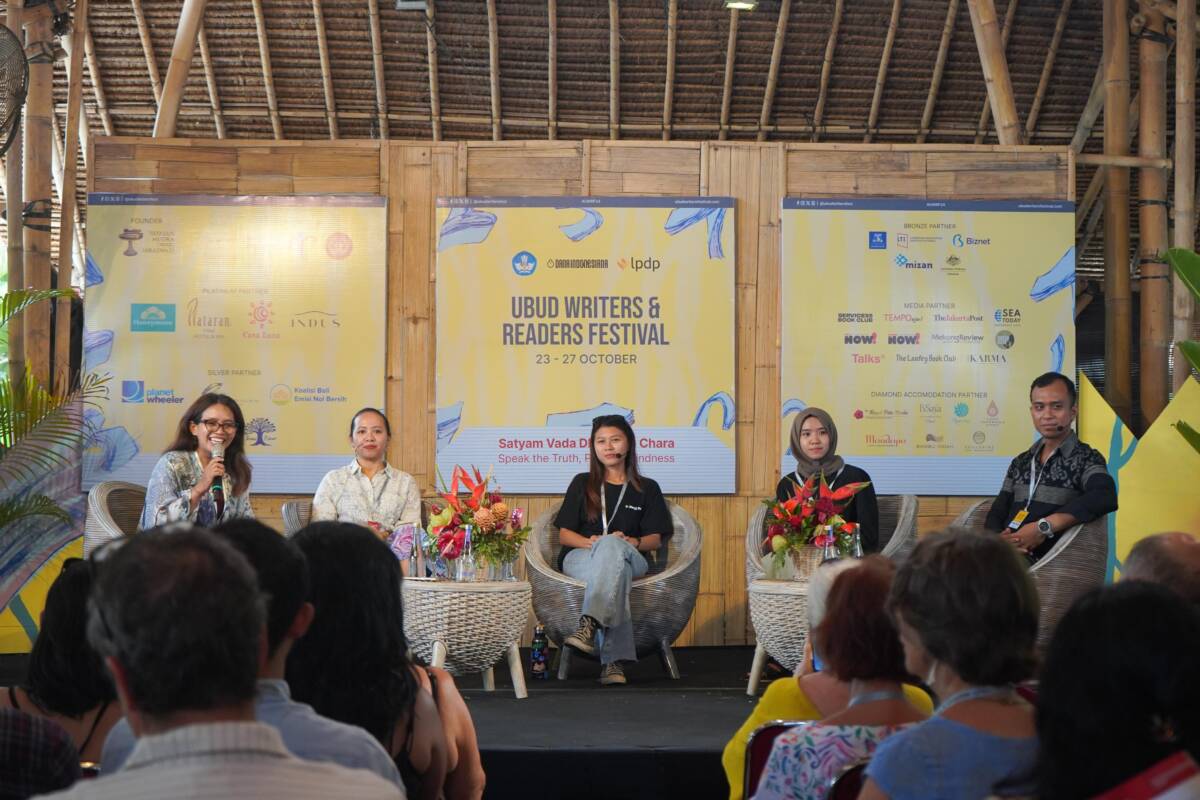Ubud, October 27, 2024 – The Province of Bali, through the launch of the Bali Net Zero Emissions initiative in August 2023, has reinforced its commitment to becoming a leading province in achieving the net zero emissions target by 2045. This pledge reflects the Bali Governor’s Regulation No. 45 of 2019 on Bali Clean Energy and marks a key milestone in the province’s journey toward sustainable development. It also highlights Bali’s grassroots initiatives, where community groups and development partners collaborate on data-driven innovations and strategies rooted in Balinese cultural values.
To further inspire all stakeholders in Bali Province to reduce carbon emissions and foster a cleaner, healthier environment, the Bali Net Zero Emissions Coalition (Bali ENB Coalition) organized a public discussion and talk show titled “Bali Net Zero Emissions Coalition: A Collaborative Effort to Transform Climate Ambition into Action” at the Ubud Writers & Readers Festival (UWRF) in Ubud, Bali (26/10/2024).
The event, held at Taman Baca, Ubud, brought together members of the Bali ENB Coalition—including the World Resources Institute (WRI) Indonesia, Institute for Essential Services Reform (IESR), New Energy Nexus (NEX) Indonesia, and CAST Foundation—as well as representatives from local communities and stakeholders. It was moderated by journalist and women’s activist Ni Ketut Sudiani.
Sofwan Hakim, Head of the Secretariat of the Bali Zero Emission Coalition, emphasized that achieving Bali’s target of Zero Emissions by 2045 will require the support and involvement of the government, stakeholders, and all levels of Balinese society. He noted that the Bali Zero Emission Coalition backs these efforts by encouraging the government to create policies grounded in Bali’s local values of harmonious living, while also collaborating with the community to develop sustainable local solutions.
“The Bali Zero Net Emission Coalition aims to develop and implement local solutions for low-carbon technologies, advocate for a just transition, and position Bali as a model for zero net emission policies and actions at the sub-national level,” said Sofwan Hakim.
Erlangga Bayu, Founder and Director of BTI Energy and Electric Wheel, explained that collaboration with WRI Indonesia has enabled the construction of an electric vehicle (EV) battery charging station powered by solar panels in Peliatan Village—one of the practical examples of clean energy integration in Ubud. The installation will be managed by a Village-Owned Enterprise, and under a business model co-developed by WRI Indonesia and BTI Energy and Electric Wheel, the revenue generated will support facility maintenance and other needs.
“With this scheme, we hope authorities in other villages will adopt similar technologies, so that these benefits reach the wider community, contributing to shared efforts to reduce congestion and establish a low-emission area in Ubud,” said Erlangga Bayu.
Marlistya Citraningrum, IESR’s Sustainable Energy Access Program Manager, stated that harnessing Bali’s abundant renewable energy is a key strategy in achieving the Bali Net Zero Emissions 2045 initiative. According to IESR data, Bali has a renewable energy technical potential of 143 gigawatts (GW). Through the Bali ENB Coalition, IESR supports the Bali government’s efforts to transition Nusa Penida to 100 percent renewable energy by 2030. Currently, Nusa Penida relies on diesel power plants (PLTD) to sustain its economic activities.
“In 2024, IESR finalized a roadmap to make Nusa Penida an iconic island powered entirely by renewable energy by 2030. Our next steps include attracting investment and resources and mobilizing support from all stakeholders, particularly PLN, the private sector, and local actors in Bali. Additionally, engaging the community is essential to drive the net-zero narrative and inspire tangible actions like installing solar PV on rooftops, hotels, and public facilities. We also hope that energy and environmental issues will be prioritized by local leaders to strengthen commitment and actions toward Bali Net Zero Emissions 2045,” Marlistya shared.
NEX Indonesia, in collaboration with Ni Nyoman Rida Bimastini (Ima), Co-founder & CMO of MagiFarm, is currently working to encourage grassroots communities to adopt climate solutions and innovations—one of which focuses on food waste management in Bali.
“Most of the waste in Bali is organic, which, if left untreated, produces methane gas. With support from New Energy Nexus, we’ve partnered with village officials to manage organic waste at TPS3R Kertalangu Kesiman, utilizing the black soldier fly (BSF) maggot life cycle to efficiently process the waste. Our hope is to establish small-scale waste management facilities across Balinese villages that are accessible to the community. This village-scale solution has the potential for significant growth, but we can’t do it alone. Local solutions need support from the community, entrepreneurs, government, and various stakeholders,” said Ima.
Tafia Sabila Khairunnisa, Design Researcher at Fab Lab Bali, highlighted the importance of working closely with communities to shift the paradigm from consumers to producers, especially in promoting a clean energy transition tailored to local needs.
“Through activities in Serangan with the CAST Foundation, we use a collaborative approach to technology development, where the community participates as co-creators. We support community members in problem-solving, capacity building, and fostering a culture of innovation grounded in local potential and traditional values. By introducing digital fabrication and a ‘learning through making’ approach, technology becomes more than a tool, it becomes a space for communities to experiment and innovate. With this approach, we hope that each village and community can evolve into a sustainable innovation lab, utilizing technology to build independence and resilience for a regenerative economy,” said Tafia Sabila.

